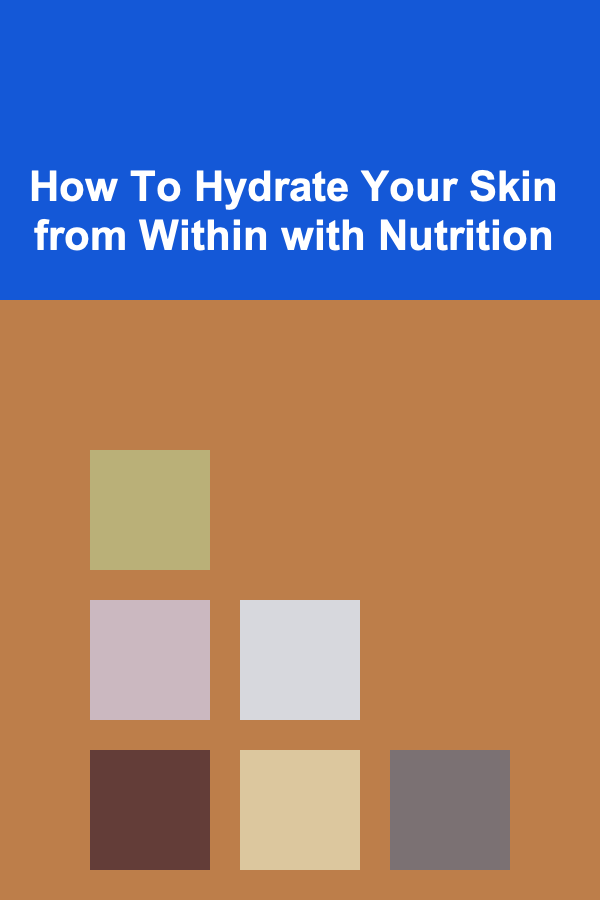
How To Hydrate Your Skin from Within with Nutrition
ebook include PDF & Audio bundle (Micro Guide)
$12.99$5.99
Limited Time Offer! Order within the next:

Skin hydration is one of the fundamental pillars of maintaining healthy, youthful skin. While topical products like creams, oils, and moisturizers have long been the go-to solutions for skin hydration, many people overlook the profound impact that nutrition can have on skin health. Hydrating your skin from within is not only possible but essential for achieving long-term, radiant skin. The way you nourish your body directly affects your skin's appearance, texture, and overall health. This article will explore the connection between nutrition and skin hydration, offering in-depth insights into the role of various nutrients in maintaining skin hydration.
The Importance of Hydration for Skin Health
Before delving into how to hydrate your skin from within, it's essential to understand why hydration matters. Hydrated skin is plump, smooth, and resilient. When the skin is dehydrated, it loses its natural glow, becomes dull, and may show signs of fine lines, wrinkles, and increased sensitivity. Dehydration can also compromise the skin's ability to defend itself against environmental stressors such as pollution, UV rays, and harsh weather.
Skin hydration isn't just about the amount of water you drink, but also about how well your skin retains moisture. This moisture retention is influenced by several internal and external factors, including nutrition, genetics, climate, and lifestyle. Proper hydration from within helps maintain the skin's moisture balance, making it less prone to dryness, irritation, and premature aging.
How Nutrition Affects Skin Hydration
Nutrition plays a significant role in skin hydration because the foods and beverages we consume provide the building blocks that support skin functions. Key nutrients like vitamins, minerals, fatty acids, antioxidants, and proteins directly influence the skin's ability to retain moisture, repair itself, and maintain a healthy barrier.
When your diet is rich in skin-nourishing nutrients, your skin becomes better equipped to stay hydrated, combat oxidative stress, and improve its overall appearance. Let's explore some of the most important nutrients for hydrating your skin from within.
Key Nutrients for Skin Hydration
1. Water
The first and most obvious element to consider when discussing hydration is water. The skin is made up of about 64% water, and keeping the body well-hydrated ensures that the skin has adequate moisture levels. Drinking enough water is crucial for maintaining skin elasticity and a smooth, supple appearance. Water also aids in flushing out toxins, which can have a direct impact on skin clarity and texture.
However, it's not just about how much water you drink but also how well your body absorbs and retains it. Water-based foods like cucumbers, melons, and oranges can enhance hydration because they provide not just water, but also electrolytes and nutrients that aid in water retention at the cellular level.
2. Omega-3 Fatty Acids
Omega-3 fatty acids are essential fats that play a critical role in maintaining healthy skin. These healthy fats help create a barrier on the skin's surface, which locks in moisture and prevents dehydration. They also help reduce inflammation, which can lead to redness, dryness, and irritation. Omega-3 fatty acids also support the skin's lipid barrier, which is essential for preventing moisture loss.
Sources of omega-3s include fatty fish like salmon, mackerel, and sardines, as well as plant-based options like chia seeds, flaxseeds, and walnuts. Consuming these omega-3-rich foods regularly can significantly enhance your skin's hydration and elasticity.
3. Antioxidants (Vitamin C, Vitamin E, and Beta-Carotene)
Antioxidants are crucial for protecting the skin from oxidative stress caused by free radicals. Free radicals are unstable molecules that can damage skin cells, leading to premature aging, wrinkles, and dehydration. Vitamins C and E, along with beta-carotene (a precursor to Vitamin A), are some of the most effective antioxidants for skin hydration.
- Vitamin C is essential for collagen production, which keeps skin firm and hydrated. It also helps in the repair and regeneration of skin cells. Citrus fruits, berries, bell peppers, and leafy greens are excellent sources of Vitamin C.
- Vitamin E is a fat-soluble antioxidant that helps protect the skin from UV damage and retains moisture. It also has anti-inflammatory properties that support skin healing. Almonds, sunflower seeds, avocados, and leafy greens are rich in Vitamin E.
- Beta-Carotene is a plant-based form of Vitamin A, and it provides the skin with powerful antioxidant protection. It helps maintain healthy skin by promoting cell turnover, which can improve hydration. Carrots, sweet potatoes, and pumpkin are rich sources of beta-carotene.
4. Collagen and Protein
Collagen is the most abundant protein in the skin, responsible for providing structure, strength, and elasticity. As we age, the body's collagen production decreases, leading to sagging and dehydrated skin. Consuming collagen-rich foods or collagen-boosting nutrients can help support the skin's hydration levels.
Proteins, in general, are essential for repairing skin cells and maintaining the skin's moisture balance. Foods rich in amino acids, the building blocks of protein, help support skin regeneration and hydration. Bone broth, chicken, fish, eggs, and plant-based proteins like beans and lentils are excellent sources of collagen and protein.
5. Zinc
Zinc is an essential mineral that plays a vital role in maintaining skin health. It is involved in collagen synthesis, skin cell production, and the healing process of damaged skin. Zinc also helps regulate oil production, reducing the likelihood of clogged pores and breakouts.
A zinc deficiency can lead to dry, flaky skin and impaired wound healing. Foods rich in zinc include oysters, red meat, chickpeas, lentils, seeds, and nuts. Incorporating these foods into your diet can help your skin retain moisture and prevent dehydration.
6. Hyaluronic Acid
Hyaluronic acid is a naturally occurring substance in the body that helps retain moisture in the skin. It can hold up to 1,000 times its weight in water, making it an incredibly potent hydrating agent. While hyaluronic acid is often used topically in skincare products, it can also be consumed through nutrition.
Bone broth is an excellent source of hyaluronic acid because it contains collagen, glucosamine, and other nutrients that support skin hydration. Other sources of hyaluronic acid include root vegetables, such as sweet potatoes, and leafy greens like spinach.
7. B Vitamins
B vitamins, especially B2 (riboflavin), B3 (niacin), and B5 (pantothenic acid), are essential for healthy skin. They help maintain the skin's moisture balance, support cell turnover, and prevent excessive dryness or inflammation.
- Vitamin B2 (Riboflavin) supports the skin's barrier function, preventing water loss and promoting hydration.
- Vitamin B3 (Niacin) helps improve the skin's elasticity and prevents water from evaporating.
- Vitamin B5 (Pantothenic Acid) plays a role in skin regeneration and repair.
Whole grains, eggs, nuts, seeds, and leafy greens are rich in B vitamins and can help maintain optimal skin hydration levels.
How to Hydrate Your Skin from Within: Practical Tips
While the nutrients discussed above are essential for skin hydration, it's also important to implement practical strategies to ensure your skin is hydrated from within.
1. Drink Plenty of Water
Start by drinking adequate water throughout the day. Aim for at least 8 glasses (about 2 liters) of water daily. If you are active or live in a hot climate, you may need more. Remember that hydration is a long-term commitment, so consistency is key.
2. Eat Hydrating Foods
Incorporate water-rich foods into your diet. Fruits and vegetables like cucumbers, watermelon, oranges, strawberries, and lettuce can help keep your skin hydrated from the inside out.
3. Consume Omega-3 Fatty Acids
Add fatty fish like salmon, mackerel, and sardines to your meals two to three times a week. Alternatively, include plant-based sources like flaxseeds, chia seeds, and walnuts in your diet to ensure an adequate intake of omega-3s.
4. Boost Collagen Production
Consume collagen-boosting foods like bone broth, eggs, and leafy greens. You may also consider supplementing with hydrolyzed collagen peptides, which have been shown to improve skin hydration, elasticity, and reduce the appearance of fine lines.
5. Include Antioxidant-Rich Foods
Eat a wide variety of antioxidant-rich foods, such as berries, citrus fruits, leafy greens, and colorful vegetables. These foods protect the skin from oxidative stress, which can lead to dehydration and premature aging.
6. Maintain a Balanced Diet
A well-rounded, nutrient-dense diet will provide all the essential vitamins and minerals necessary for skin health. Avoid excessive sugar and processed foods, which can lead to inflammation and skin dehydration.
7. Supplement if Necessary
If you feel that your diet is lacking in certain nutrients, consider supplementing with vitamins and minerals that support skin hydration, such as zinc, vitamin C, and hyaluronic acid.
Conclusion
Hydrating your skin from within requires more than just drinking water; it involves nourishing your body with the right nutrients to maintain moisture balance, elasticity, and overall skin health. By incorporating a variety of hydrating foods, essential fats, antioxidants, and vitamins into your diet, you can support your skin's ability to retain moisture, repair itself, and stay youthful.
Remember, the foundation of beautiful, hydrated skin starts from the inside out. A consistent, balanced approach to nutrition, along with proper skincare, will ensure that your skin remains glowing, healthy, and hydrated for years to come.

How to Build a Home Security System Using Smart Devices
Read More
How to Deep Clean Your Kitchen in Just One Hour
Read More
How to Keep Your Home's Windows in Top Condition
Read More
How to Use Customer Support Software to Make Money
Read More
Why Organizing Your Cleaning Supplies Improves Efficiency
Read More
Brewing Strong Coffee with a Moka Pot: A Comprehensive Guide
Read MoreOther Products

How to Build a Home Security System Using Smart Devices
Read More
How to Deep Clean Your Kitchen in Just One Hour
Read More
How to Keep Your Home's Windows in Top Condition
Read More
How to Use Customer Support Software to Make Money
Read More
Why Organizing Your Cleaning Supplies Improves Efficiency
Read More